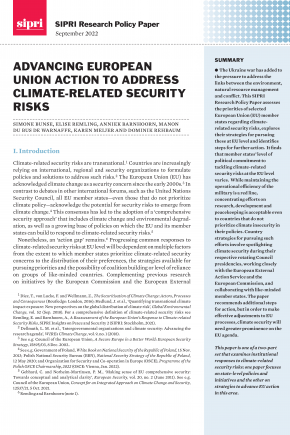Advancing European Union Action to Address Climate-related Security Risks

This SIPRI Research Policy Paper assesses the priorities of selected European Union (EU) member states regarding climate-related security risks, explores their strategies for pursuing these at EU level and identifies steps for further action. It finds that member states’ level of political commitment to tackling climate-related security risks at the EU level varies. While maintaining the operational efficiency of the military is a red line, concentrating efforts on research, development and peacekeeping is acceptable even to countries that do not prioritize climate insecurity in their policies. Country strategies for pursuing such efforts involve spotlighting climate security during their respective rotating Council presidencies, working closely with the European External Action Service and the European Commission, and collaborating with like-minded member states. The paper recommends additional steps for action, but in order to make effective adjustments to EU processes, climate security will need greater prominence on the EU agenda.
This paper is part of a two-paper set that examines institutional responses to climate-related security risks with one paper focusing on state-level policies and initiatives and the other on strategies to advance EU action in this area. On state-level responses to CRSRs, the other paper in this set, see Bunse, S. et al., Mapping European Union Member States’ Responses to Climate-related Security Risks, SIPRI Research Policy Paper (SIPRI: Stockholm, 2022).
A separate annex contains the draft case studies that were written up as background research for these two papers. This annex has been provided to give additional information and practical examples from different country contexts; it includes Belgium, France, Germany and Ireland. However, as unedited research material, this annex is not considered part of the formal SIPRI publication.
I. Introduction
II. Climate security decision making in the European Union
III. Member state priorities and strategies on climate security in the European Union
IV. Towards further collaborative action on climate-related security risks
V. Conclusions
Appendix A. Analytical framework and methodological considerations
Appendix B. Similarities and differences between selected European Union member states across various dimensions





